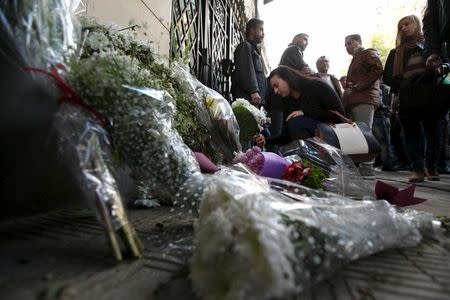Egyptian investigator in Italian's death has prior conviction linked to death of detainee-court documents, sources

By Ahmed Mohamed Hassan CAIRO (Reuters) - A senior Egyptian police officer investigating the death of Italian student Giulio Regeni has a prior conviction in connection with the torture and death of a detainee, according to security and judicial sources and court documents seen by Reuters. Regeni, 28, disappeared on Jan. 25, the fifth anniversary of the 2011 uprising that ended President Hosni Mubarak's 30-year rule. His body was found on the side of the main Cairo-Alexandria highway on Feb. 3. Egyptian forensics and prosecution officials have said he was tortured and killed by a blow with a sharp object to the back of the head. Khaled Shalaby, now head of Criminal Investigations in Giza and one of the investigators in the Regeni case, and three others were charged in 2000 with torturing and killing a detainee inside a police station in Alexandria, according to the security and judicial sources and documents. One document from the Alexandria Criminal Court shows that Shalaby and three other policemen were initially cleared of the charges related to the killing of Farid Shawqi Ahmed Abdel Aal. A retrial led to the conviction of Shalaby and the three others in 2003 on reduced charges of failing to protect the detainee and not transferring him to hospital, according to a ruling from the Alexandria Criminal Court seen by Reuters. The court handed Shalaby a one-year jail sentence with labour that was suspended. The court documents show that the accused officers claimed that during his arrest, Abdel Aal hit his own head against a pole and later died of wounds. Contacted by telephone, Shalaby denied any wrongdoing: "There are no cases against me and I don't understand what does this have to do with the Italians case?," he said. Shalaby became head of Criminal Investigations in Alexandria in 2009 and was transferred in 2013 to Giza where he was promoted to head the Criminal Investigations unit, according to a security source. The Criminal Investigation unit Shalaby heads is one of several involved in the investigation, which is led by Homeland Security and also includes Italian security officers. On Feb. 4 the website of the pro-government newspaper Youm7 quoted him as saying Regeni's body bore no signs of a criminal act. "Preliminary investigations show he was the victim of a car accident," he was quoted as saying. Egyptian Interior Ministry spokesman Abu Baker Abdel Karim did not respond to calls by Reuters but a ministry statement issued on Monday denied media reports that Regeni had been arrested by security forces. But Ahmed Nagy, a senior prosecutor in Giza, said Regeni's body bore cigarette burns and slits to the ears. The Egyptian coroner's report has not been made public but other forensic and prosecution sources have said it found signs of torture including broken ribs and electrocution. A copy of Regeni's professional biography provided by a friend showed he spoke Arabic and that his doctoral research at Britain's Cambridge University focused on trade union activity in Egypt after Mubarak's overthrow. Friends of Regeni said his research may have led him to meet labour activists and critics of the current government of President Abdel Fattah al-Sisi, who is waging the fiercest crackdown on dissent in Egypt's modern history. Rights groups allege that Egyptians are often detained by police on scant evidence and beaten, sometimes to death. The Interior Ministry and other Egyptian authorities denies police brutality is endemic and say any allegations of abuses are investigated. Critics say investigations are not always thorough. Regeni's death could complicate efforts by Sisi's government to project an image of stability to win back tourists and foreign investors scared off by years of post-uprising turmoil. Regeni's body was returned to Rome on Feb. 6, where the Italian authorities conducted a second autopsy. Italian Interior Minister Angelina Alfano told Sky News 24 television station that autopsy had revealed "something inhuman, something animal". (Additional reporting by Lin Noueihed, Amina Ismail and Haithem Ahmed in Cairo and Steve Scherer in Rome, Writing by Lin Noueihed; Editing by Michael Georgy)

